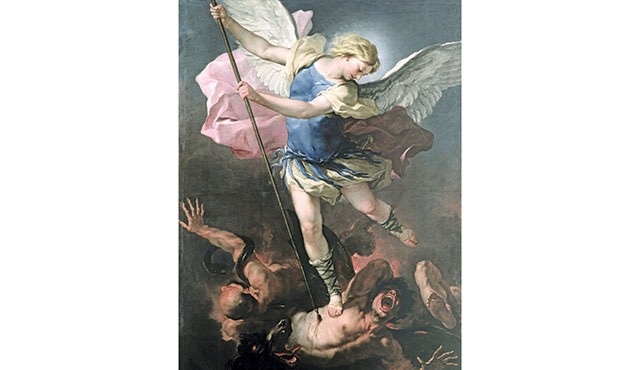He is known as the Protector of Israel, Guardian of Purgatory, Guardian of the Blessed Sacrament, Guardian of the Pope, Defender of France, Defender of Vatican City, and Defender of the Catholic Church. He leads his armies where others fear to tread, even if means to the gates of hell. His name is translated as “Who is like God?” It is not a statement, but a question of humility, and one that echoes the Psalmist: “For who is God, but thee, O Lord?” (Psalm 18:31).
He is Saint Michael the Archangel, the one who fearlessly and humbly rose to defend the honor of God against the pride of Lucifer. Such a battle is not relegated to the mists of the past, but is waged in our own time, in our own hearts. Shall we choose evil over good? There has never been a time like the present, when uncertainty, sickness, and fear dominate. We are challenged like Job, who yet finds the faith to say, “Though he slay me, I will hope in him” (Job 13:15).
“Saint Michael and the presence of whole choirs of angels, who we see frequently appear in pivotal parts of Scripture, remind us that spiritual warfare is indeed a reality and not to be taken lightly,” Bishop Vann noted. “It affects us all, in our own way, and we all know and have experienced at times that life’s trials are very real. Every day, indeed every moment, presents a choice for us to do well and avoid evil (see 1 Thessalonians 5:22).”
We see in Saint Michael a figure who bridges divides, a trait sorely needed in today’s divided society. He builds bridges between faiths, particularly with the Jewish and Christian religions. In a lovely work from Jewish literature, The Life of Adam and Eve, although Michael is assigned to escort the two from Paradise, it is Michael who teaches Adam how to plant, and aids Eve in giving birth. We find him throughout Christian history at major turning points in the life of the faith, from inspiring Constantine, whose glorious Constantinople in its prime contained 15 churches dedicated to Saint Michael.
Michael is one of France’s greatest saints, sparking its heroic historical figures with deep attachment to their Catholic identity. He inspired two of France’s greatest female saints, Joan of Arc and Thérèse of Lisieux. Joan, the obscure peasant girl who somehow managed to lead the French army in military victories over the English, relied on the “voice” of Saint Michael for guidance throughout her improbable string of successes.
“No, the Church will not triumph…how could it resist my triumph?” Saint Thérèse of Lisieux gave Lucifer this line in her play about Saint Michael and Lucifer’s battle, The Triumph of Humility. Thérèse argues it is Michael’s great virtue, humility, that ultimately defeated Satan. In this way, Saint Michael the Archangel is not a warrior angel who seeks to inflict violence upon his enemies, but is rather a warrior angel of peace, clad in the armor of virtues and armed with the sword of conversion. He is one who dutifully serves the Holy Trinity and the Mother of God, whose own example of humility inspires all others, including Michael. “I am vanquished! I am vanquished!” Lucifer finally withers in defeat in Thérèse’s play.
Could Michael, then, be the nameless Angel of Peace from the Fatima miracles?
The Angel of Peace comes to three children in time of war. The angel holding the flaming sword—symbolizing, as Cardinal Ratzinger (the future Pope Benedict XVI) taught in his theological commentary on the third secret of Fatima, judgment pending over the world—echoes the angel of the flaming sword in Genesis who guarded the entrance to Eden. The Angel of Peace may be unnamed, but the case for Saint Michael is compelling.
When countries found themselves in significant crises of national identity, whether it be Rome in the time of Constantine or during times of plague, or France when its Catholic heritage was under assault, or Portugal’s own history of Catholic culture, Michael is never far away from intervening in events for the sake of a better world, one oriented to God. Such is the state of spiritual affairs in the United States. It may be a country that prides its separation of church and state, but sometimes the only resolution or recourse is leaning on the spiritual graces of the Cross.
After all, Christ did just that on the Mount of Olives, when “an angel administered to him” (Luke 22:43). That angel’s name is not recorded, but we know Saint Michael is also the “Prince of the Heavenly Host,” who is said to help bring the souls to heaven upon death.
Saint Michael thus waits, angelic sword at the ready, ready for anything. Ready to bring us home.

